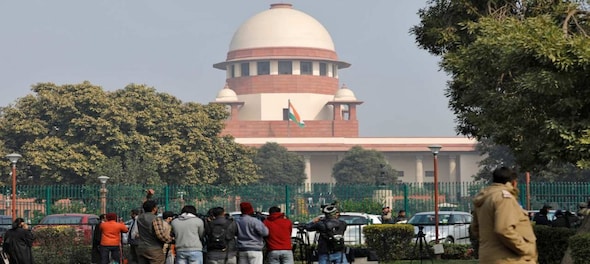
Both married and unmarried women are entitled to safe and legal abortions, said the Supreme Court while delivering the verdict on the interpretation of the Medical Termination of Pregnancy (MTP) Act on Thursday.
The court said that marriage couldn't be the source of abortion rights, and one needs to recognise other structures beyond families for such rights.
The Supreme Court said the distinction between married and unmarried women under the abortion laws is artificial and constitutionally unsustainable. It perpetuates the stereotype that only married women are sexually active, the court said.
"The decision to carry a pregnancy or to abort it lies in reproductive autonomy and is rooted in bodily autonomy. The treatment can't be denied based on marital status," the court said.
The bench of Justices DY Chandrachud, AS Bopanna, and JB Pardiwala also said, "Excluding unmarried woman from terminating pregnancy beyond 20 weeks is violative of Article 14."
Article 14 says the state shall not deny to any person equality before the law on the grounds of religion, race, caste, sex or place of birth.
As per the MTP Rules, only survivors of rape, minors, women whose marital status changed during pregnancy, mentally-ill women, or women with foetal malformation are allowed to terminate pregnancy up to 24 weeks. This did not include unmarried women whose pregnancy arises out of a consensual relationship.
On July 21, the Supreme Court had allowed a pregnant, unmarried woman to abort her 24-week foetus.
Yet again, the Supreme Court held that all women, irrespective of their marital status, are entitled to safe and legal abortion till 24 weeks of pregnancy under the MTP Act.
Supreme Court's big verdict on marital rape
Besides this, the Supreme Court, in a historic verdict, recognised marital rape and said that under the MTP Act, rapes should also include marital rape. The sexual assault by husbands can take the form of rape, added the court.
“Rape means sexual intercourse without consent and intimate partner violence is a reality. In this case also, woman may get forcefully pregnant… Any pregnancy alleged to be caused by force is rape," the bench was quoted by News 18 as saying.
He, however, added that "… the meaning of rape must be understood to be marital rape solely for the purposes of MTP Act. This is important to save the woman from a forceful pregnancy."
What's the case
The case pertains to a 25-year-old who wanted to abort her 24-week pregnancy arising out of a consensual relationship. The woman had said that her partner, with whom she was in a consensual relationship, had refused to marry her.
According to a PTI report, she had stressed that giving birth out of wedlock would cause her psychological agony as well as social stigma and she was not mentally prepared to be a mother.
The matter was earlier heard in the Delhi High Court. The high court had then denied the permission to abort saying that it virtually amounts to killing the foetus.
"Rule 3B of the Medical Termination of Pregnancy Rules, 2003 (which excludes unmarried women) stands, and this court, while exercising its power under Article 226 of the Constitution of India, 1950, cannot go beyond the statute," the high court had said in its order.
The high court, however, sought the Centre's response on the woman's contention that the exclusion of unmarried women from being allowed to undergo medical termination of pregnancy up to 24 weeks, was discriminatory.
The Centre, represented by Additional Solicitor General Aishwarya Bhati, had told the top court that discrimination if any, is not in the Act passed by Parliament and if the court is willing to intervene, then it should do so in the MTP Rules, 2003.
When the matter reached Supreme Court, the court then expanded the scope of the MTP Act to include unmarried women and allowed a 25-year-old to abort.
"Denying an unmarried woman the right to a safe abortion violates her personal autonomy and freedom. Live-in relationships have been recognised by this Court," it had added.
On August 23, The Supreme Court had reserved its verdict on the issue of interpretation of the MTP Act. It had said that it would interpret the Act in such a manner that discrimination between married and unmarried women is removed to allow abortion till 24 weeks of pregnancy.
Observing there is a need to "fine-tune" the provisions in the MTP rules, the court had also said it would like to add a category of women, who suffer desertion irrespective of marital status, to the seven categories of women eligible to seek abortion till 24 weeks of pregnancy.
It had also said that the use of the word "partner" ascribes to an intention of the Parliament to cover "unmarried woman" under the Act which is in consonance with the constitution.
(With inputs from agencies)
(Edited by : Akriti Anand)
First Published: Sept 29, 2022 1:05 PM IST
Check out our in-depth Market Coverage, Business News & get real-time Stock Market Updates on CNBC-TV18. Also, Watch our channels CNBC-TV18, CNBC Awaaz and CNBC Bajar Live on-the-go!


Stampede-like situation disrupts Rahul Gandhi, Akhilesh Yadav's joint rally in Uttar Pradesh
May 19, 2024 4:26 PM
Ladakh Lok Sabha election: With Independent candidate's entry, it's now a 3-way contest for BJP and Congress
May 19, 2024 4:01 PM

